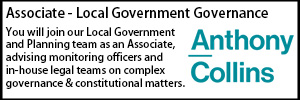Welsh remote meetings regulations - getting democracy moving in the lockdown?
- Details
The Welsh Local Authorities (Meetings) (Wales) Regulations 2020 differ from the England and Wales 2020 Regulations in a number of ways, including not requiring the public to be able to hear meetings. Annabel Graham Paul discusses their main features, interpretation, and thoughts for their application.
The Local Authorities (Meetings) (Wales) Regulations 2020 contain some very significant differences from their English (and partially Welsh) counterpart, the Local Authorities and Police and Crime Panels (Coronavirus) (Flexibility of Local Authority and Police and Crime Panel Meetings) (England and Wales) Regulations 2020.
Announcing the new Regulations on 22 April 2020, Julie James AM, Minister for Housing and Local Government, said: “I do not expect local authority meetings to return to normal for some months and therefore Councils will need to be flexible to provide for urgent business relating to COVID-19”. If local authorities want the democratic process to be done, and to be seen to be done, it is therefore important for councils to understand and use the scope of the Regulations to bring an element of democratic accountability into their decision-making, wherever possible.
The Regulations require local authorities to have regard to guidance issued by the Welsh Ministers in conducting remote hearings, which is yet to be published (Regulation 5(5)). That guidance may clarify how the Regulations are to be applied in practice by different bodies.
The Regulations apply to meetings held before 1 May 2021 of a principal council, an executive of a principal council, a community council, a joint board, a port health authority, a fire and rescue authority, a National Park authority and a joint committee of two or more of those bodies (note that the English and Welsh Regulations apply to Police and Crime Panels in Wales, but not to any other public bodies in Wales). ‘Meetings’ is widely defined and includes any meeting of the bodies listed, including both committee and sub-committee meetings (Regulation 2(i)). The Regulations override any provision contained in the standing orders, executive arrangements or any other rules of a local authority (Regulation 3).
Meetings can be by telephone, Skype, Zoom or “any equipment or other facility which enables persons who are not in the same place to speak to and be heard by each other (whether or not they can see each other)” (Regulation 5(2)).
The England Regulations are not the same. The absolute requirements of Regulation 5 are that Members and other persons entitled to speak at the meeting must be able to:
(i) Hear, and be heard by each other;
(ii) Be heard by any other members of the public attending the meeting.
In addition, if it is practicable, Members and other persons entitled to speak at the meeting should be able to:
(iii) See, and be seen by each other;
(iv) Be seen by any other members of the public attending the meeting.
Accordingly, the law in Wales does not provide that councils have to use video conferencing technology, even where practicable. Furthermore, there is no requirement for the public to be able to hear the meeting. A telephone conference amongst Members alone appears to suffice. Guidance may, however, make particular recommendations for different levels of authority, depending on their likely technological capabilities.
Crucially, Regulation 20 appears to extend a public body’s power to exclude members of the public and press from meetings to whenever desired, rather than only for reasons concerning confidentiality or prejudice. However, readers should note that Regulation 20 is rather obscurely drafted on this point and does not appear to omit all of the relevant words of s. 1(2) of the Public Bodies (Admission to Meetings) Act 1960. The Explanatory Memorandum says that: “Local authorities may, if practicable, enable members of the public and the press to attend certain meetings remotely”, words which do not find form in the Regulations themselves. However, it is clear there is no mandatory requirement to live-stream meetings in Wales. This is a fundamental difference to the English Regulations where the public must be able to attend a remote meeting through remote means including video conferencing, live webcast, and interactive streaming (Regulation 13).
To mitigate the effect of the potential for total public (and press) exclusion from local authority (and other public body) meetings in Wales, the Regulations set out a detailed procedure for the electronic publishing of material relating to meetings to achieve a level of public accountability. Such details are left open in the English Regulations to be set out in standing orders or other rules of the authority (Regulation 5(6)). The detailed requirements in the Welsh Regulations may be summarized as follows:
- Notices and summonses can be sent / published electronically (Regulation 17);
- Public notice of the time of the meeting (and, if it is open to the public, how to access it) must be given electronically at least 3 clear days before the meeting (or if convened at a shorter time, as soon as reasonably practicable). The agenda for the meeting as supplied to members must also be published electronically in advance of the meeting (excluding any relevant item), together with such further statements or particulars, if any, as are necessary to indicate the nature of the items or any reports or other documents supplied to members in connection with the item (Regulation 20(ii));
- As soon as reasonably practicable after a meeting of a principal council, and in any event before the end of a period of five working days beginning on the day the meeting is held, a note must be published electronically setting out names of Members who attended, any declarations of interests, any decisions taken at the meeting, including the outcomes of any votes, but excluding exempt information (Regulation 21(5));
- A principal council must also publish electronically, as soon as reasonably practical after the meeting, the minutes of the meeting, the final agenda, so much of any report for the meeting as relates to an item during which the meeting was not open to the public (if it has not already been published) (Regulation 21(6)).
These detailed reporting requirements should go some way towards alleviating the potential unfairness and lack of transparency caused by excluding the public from a meeting. What is lacking in the Regulations is any direction as to how the public might comment – by way of late representations or otherwise – having had sight of the agenda and other documents in advance of the meeting. To reduce the risk of grievances, where a meeting is not held with virtual public attendance, it is important that authorities ensure they do all that is reasonably practical to take into account any public or other interested party’s comments (whenever they are made) and report on the discussion at the meeting as fully as possible.
In terms of smaller authorities, the flexibility in the Regulations to exclude the public seems reasonable, as community councils and town councils – who may only employ one member of staff – may find it very challenging to conduct business with a live-stream requirement. By contrast, the England-only Regulations could be seen to impose a substantial burden on parish councils and smaller town councils. That said, principal authorities should not be complacent or neglect their duty of accountability towards their constituents and it would be surprising if they did not go significantly further than what is required of them under the Regulations to ensure a greater degree of public accessibility.
Annabel Graham Paul is a barrister at Francis Taylor Building. She welcomes any comments or questions on the above summary and information on any particular experiences or proposals by individual authorities. Get in touch by
Head of Legal Services / Deputy Monitoring Officer
Legal Director - Government and Public Sector
Locums
Poll

















